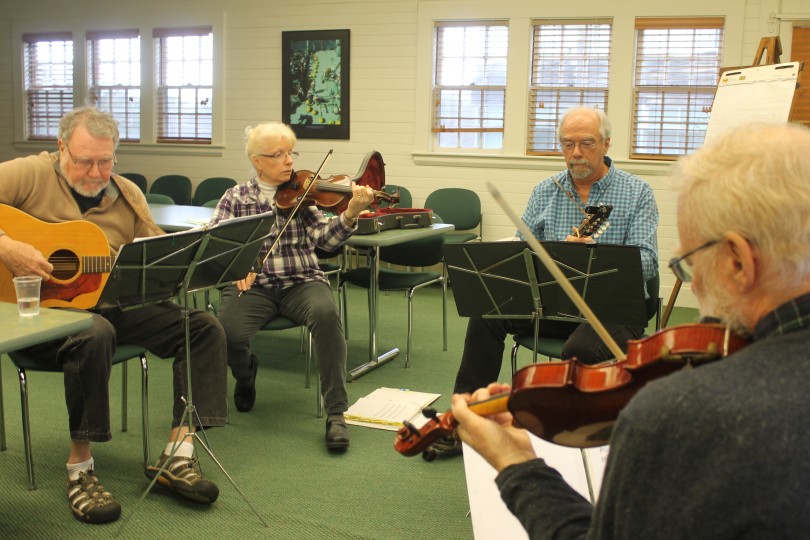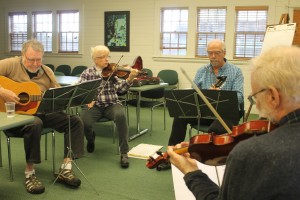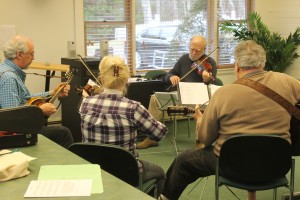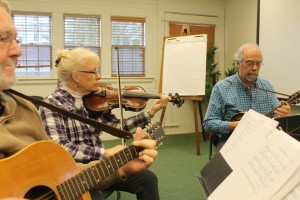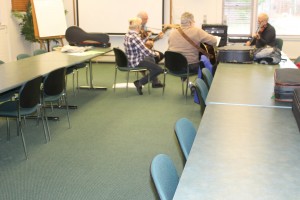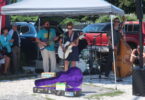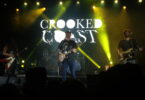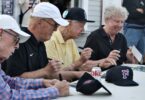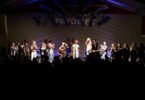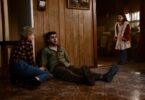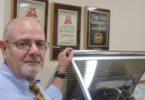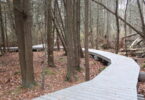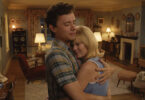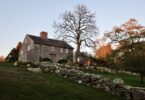WOODS HOLE – “It’s a lunch hour that I call, ‘Nothing like work,’ ” said Ellen Bailey, who seven years ago or so organized a loose gathering of Woods Hole Oceanographic Institution employees and friends to play, practice and learn Celtic music and the like on their lunch hour.
The official name of the twice-a-month gathering, as advertised in the WHOI Headlines, a WHOI newsletter, is “Tunes At Noon.”
“Music is the best thing there is in life, frankly,” said Jack Cook, a mandolin player, and an illustrator in the graphics department at WHOI. Noting that his job, with its deadlines, can be stressful, he said of music in general and specifically Tunes At Noon, “You know, it helps me relax my mind a little bit.”
Twice a month on a Tuesday, a group as small as four or as large as 12 gather in a conference room in the Carriage House on WHOI’s Quissett Campus. They pull out guitars, mandolins, fiddles, and whatever else they might think to bring. One thing they bring is music stands. They are there to learn.
“Although I organized this group, I am the least of the musicians in it,” said Bailey, executive assistant to the Director of Research at WHOI. “I consider them generous musicians in that they’re letting a new musician into the fray,” she said. She plays the fiddle.
On this particular Tuesday when Cape Cod Wave visited, there were only four musicians, making the connection, both personal and musical, very clear. “Ellen has been a friend for a while,” said Bruce Woodin, who played guitar.
Woodin, a retired WHOI scientist in molecular toxicology – “looking at how chemicals in the ocean affected gene expression in various organisms in the ocean” – said he especially enjoys the people who show up at Tunes at noon.
It was a common theme of all four attending on this Tuesday. Woodin, who used to also be a vocalist until several disc surgeries damaged one of his vocal chords, said, “It’s a lifeline for me to be able to keep doing music with these great people.”
Music as a lifeline. It can mean so many things to so many people, and yet almost everyone – even non-musicians – can understand it in some way. But for these folks who gather for Tunes At Noon, it is both lifeline and part of life.
“I’ve always had the fiddle around,” said David Leslie, who began playing classical music as a boy. Leslie, a retired research scientist from a geophysical service company, said he had actually quit playing for several decades and then took up Irish and Scottish music while working in England.
While Leslie doesn’t work at WHOI, “I was a student here in the 1970s,” and “people I know told me there was a group here.” Leslie said he plays in other Irish “sessions” and was clear that the Woods Hole gathering was not a session.
A typical session, he said, is people calling out tunes and sitting around in a circle with a beer. “Some of the sessions I’ve been to can be almost aerobic,” said Leslie.
“You wouldn’t play with music stands in a session,” he said. “This is kind of practice.”
And while some were looking at the music, all agreed that that the music they were playing was, as Bailey said, “the perfect music to learn by ear. It’s folk music.”
And, Bailey said, “The community of people is what makes me keep my bar raised high. Now I want to play with other people and that means I have to practice.”
It’s that connection between musicians – something like friendship with a common musical cause.
“These are great people,” said Cook, who also plays in a mandolin orchestra out of Providence. “We have similar tastes, but you can bring anything into it. I like Irish and Scottish music – the melodies and the harmonic musical structure. That’s what we play.”
Leslie described the music as fairly simple tunes yet eclectic tunes.
Bailey, who began playing nine years ago, said she is still learning some of the tunes, and is relatively new to her instrument. The group has given her a chance to improve her skills, she said.
Bailey and the others may be underplaying their abilities. The group, which features up to 12 players, seemed more than capable of handling the lilting wonderful folks songs that they were practicing.
In fact, the Tunes At Noon group has performed “seven or eight times” around the campus of WHOI in recent years, said Bailey. “We are background music,” she said.
And so the gathering which started by a notice in WHOI Headlines wondering whether anyone else was interested in this kind of music has turned into not just a lifeline but also an actual performing group. That’s not the point; it just sort of happened.
The point is, as Cook said, “These people I play with are good people. They are pleasant people to be with. And music makes us all feel better.”
The biggest challenge of all, it seems for a musical gathering such as Tunes At Noon, is people finding time to get there. Woodin said that before he retired “The hardest thing was making a gap in your day to make it fit.”
And Bailey said one of the perils of running such a program at WHOI is, “We’ve had people who have answered the call but couldn’t go all the time because they had to go to sea.”
– If you like Cape Cod music, here is a 6,000-word story that Cape Cod Wave did on the Cape Cod original music scene. We interviewed 20 musicians, four club owners, and two radio deejays – Cape Cod Music And The Joy Of Being Originally Alive
And here is a link to our growing collection of local music stories and videos – MUSIC

